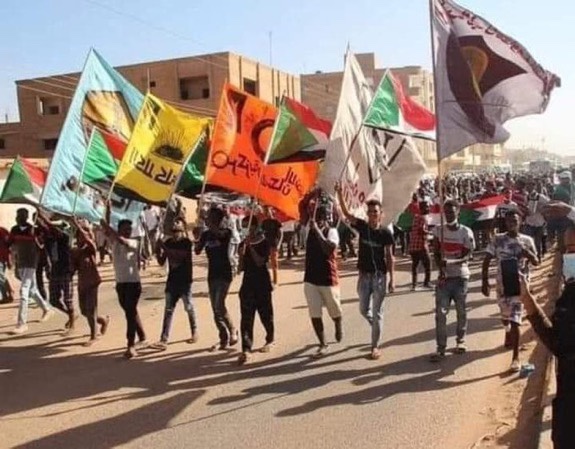Sudanese police fired tear gas to disperse mass protests that began Sunday in more than 17 cities demanding civilian rule and justice.
Sunday’s marches come a day after a march in support of the military and a rejection of a possible settlement that would give power to civilians was run by groups allied with the Muslim Brotherhood.
The authorities closed most of the main bridges connecting the capital’s three cities – Khartoum, Omdurman and Khartoum Bahri, intensified their deployment and erected concrete barriers on the main streets leading to the presidential palace and the General Command of the Army in central Khartoum.
Protesters chanted “The military to the barracks” and “The country is our right (ours) and the civility of our authority,” referring to demands for an end to military rule.
Over the past days, thousands of Sudanese have come out on the first anniversary of the military coup carried out by the army chief on October 25, 2021.
On that day, Abdel Fattah al-Burhan reneged on all the pledges he made two years ago to share power with civilians, in preparation for free elections in Sudan, and ordered the arrest of all political leaders and civilian ministers in the government, and the army seized power.
Since then, internet access has been cut off while any action against the coup is regulated.
“No negotiation, no partnership, no legitimacy”
But police later responded by using tear gas canisters to try to prevent protesters from reaching the presidential palace, an Agence France-Presse correspondent said.
Protester Asma Harzawi said in Khartoum, “We continue our movement and maintain our three principles: no negotiation, no partnership and no legitimacy (for the army), until the fall of the regime.”
Protester Momen Wad Zeinab said: “We want a real state. A year has passed and we have lost more than 118 martyrs, but we will continue with thousands of demonstrations (..) in all governorates.. The whole people are on the street.”
In the Bahri area north of Khartoum, thousands of people demonstrated to demand civilian rule. In the west of the capital in the city of Omdurman, an AFP photographer reported that demonstrators had blocked the main Arbaeen street in the center of the city by placing stones and tree branches and burning damaged car tires.
Agence France-Presse photographers reported that police fired tear gas canisters at protesters trying to reach the bridges connecting Omdurman and Bahri in central Khartoum.
In the morning, authorities closed three bridges linking the center of the capital to the areas of Omdurman, Bahri and the east of the Nile, after riot police deployed on trucks and cars equipped with water cannons in central Khartoum.
Tears gas outside the capital
Sunday’s demonstrations outside the capital, but security forces confronted them with tear gas canisters, witnesses said.
Hussein Mohammed, a resident of the eastern city of Kassala, said by phone: “About 800 young men and women have started demonstrating in the city center to demand civil authority.”
In Wad Madani state, 186 kilometres south of Khartoum, eyewitnesses confirmed demonstrations demanding civilian rule.
“About a thousand demonstrators came out chanting the people want to topple the regime and the military to the barracks,” Adel Ahmed said over the phone, noting that “they were beating drums and carrying Sudanese flags.”
Witnesses also reported that hundreds of people came out to demonstrate and demand civilian rule in the eastern Red Sea city of Port Sudan. Protests were also recorded in the city of El Obeid, 350 km west of the capital, and in the eastern state of Gedaref.
About three thousand Islamist demonstrators gathered Saturday in front of the headquarters of the United Nations Mission in Khartoum to protest its mediation in the Sudanese crisis between the military and civilians as a result of the coup, and burned pictures of the UN envoy to Sudan, Volker Perthes.
Last week, a Sudanese protester was killed by a vehicle belonging to security forces during demonstrations involving thousands in Khartoum and several other cities, according to the anti-coup Central Committee of Doctors.
This brought to 119 the number of deaths killed as a result of the repression in one year.


